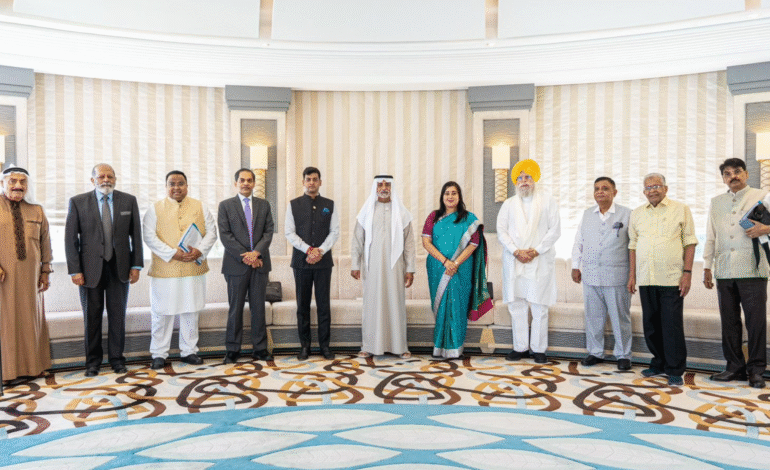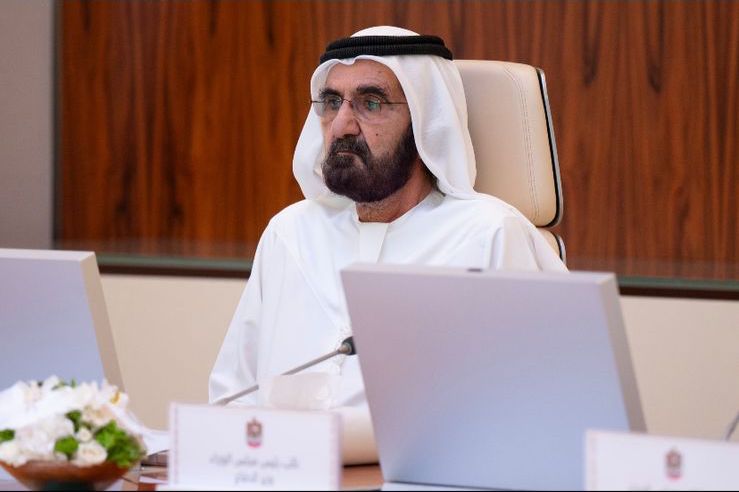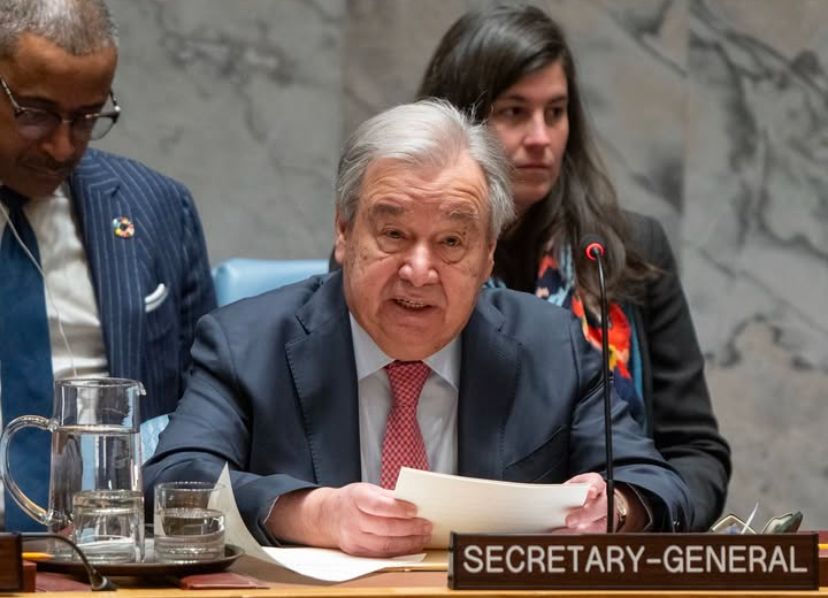India-UAE Strengthen Ties Through Operation Sindoor Talks

In a significant diplomatic development, an all-party Indian delegation led by Shiv Sena MP Shrikant Eknath Shinde arrived in Abu Dhabi on Thursday, May 22. This visit marked the beginning of a broader four-nation diplomatic outreach. The delegation’s primary aim was to discuss Operation Sindoor and emphasize India’s unwavering commitment to fighting cross-border terrorism. During the visit, the delegation held high-level meetings with leaders in the United Arab Emirates (UAE), reinforcing the collective determination to tackle terrorism through mutual cooperation.
UAE Condemns Pahalgam Terror Attacks and Supports India
The visit came shortly after the tragic terrorist attack in Pahalgam, which targeted innocent tourists in Kashmir on April 22. The attack drew widespread condemnation, with the UAE emerging as one of the first countries to strongly denounce the violence. The UAE leadership, including President Sheikh Mohamed Bin Zayed Al Nahyan and Foreign Minister Sheikh Abdullah Bin Zayed Al Nahyan, personally conveyed their condolences to Indian Prime Minister Narendra Modi and External Affairs Minister S. Jaishankar via telephone.
The Indian delegation, during their visit, provided detailed briefings on the objectives and execution of Operation Sindoor. They clarified the operation’s strategic intent and emphasized its targeted and non-escalatory nature.
Meetings with UAE Leaders Highlight Shared Values
One of the key highlights of the visit was a meeting between the Indian delegation and Sheikh Nahyan Mabarak Al Nahyan, Minister of Tolerance and Coexistence. Sheikh Nahyan expressed deep condolences for the Pahalgam victims and reaffirmed the UAE’s solidarity with India. He emphasized the shared values of peace, tolerance, and coexistence that form the foundation of India-UAE relations.
The UAE Minister stated that terrorism remains a global threat that must be addressed collectively. “India and the UAE will tackle terrorism together. The UAE will always stand by India,” he said, according to a statement from the Indian Embassy in Abu Dhabi.
United Anti-Terrorism Stance of Diverse Indian Delegation
The Indian delegation represented a cross-section of the political spectrum, reflecting national consensus on counter-terrorism. It included MPs Bansuri Swaraj, ET Mohmd Basheer, Atul Garg, Sasmit Patra, and Manan Kumar Mishra. BJP leader Surendrajeet Singh Ahluwalia and former Ambassador Sujan Chinoy also participated, bringing both political diversity and diplomatic expertise.
This broad representation demonstrated India’s united stance against terrorism, with all parties showing support for the government’s decisive response to the Pahalgam attack through Operation Sindoor. The delegation stressed that terrorism knows no boundaries and requires a unified, non-partisan approach to be effectively countered.
Dialogue with Emirati Parliamentarians Enhances Cooperation
The delegation engaged in in-depth discussions with Dr. Ali Rashid Al Nuaimi, Chairman of the Defence, Interior & Foreign Affairs Committee of the UAE’s Federal National Council. These talks were central to aligning legislative and strategic views between the two countries.
Dr. Al Nuaimi acknowledged India’s proactive efforts and reiterated the need for the global community to respond decisively to terrorism. He emphasized the role of collaborative governance, legislative coordination, and public awareness in tackling extremist ideologies. According to him, the international community must act now to prevent the spread of terror networks.
Media Dialogue Counters Misinformation Campaigns
A crucial part of the delegation’s mission involved countering misinformation and foreign propaganda. The delegation met with Dr. Jamal Al Kaabi, Director General of the National Media Office of the UAE. The discussions focused on the growing disinformation campaigns originating from Pakistan and their potential to destabilize regional peace.
The Indian officials presented factual evidence to highlight the spread of false narratives and emphasized the importance of ethical journalism and responsible communication. By actively engaging with media leadership, the delegation sought to build transparency and trust in India’s counter-terror actions.
Interview with The National Enhances Global Awareness
As part of its media outreach, delegation leader Shrikant Shinde granted an exclusive interview to The National, a prominent UAE daily. In the interview, he elaborated on India’s long-standing battle against cross-border terrorism and explained the strategic rationale behind Operation Sindoor.
Shinde provided a detailed timeline of events leading up to the operation and emphasized that it represented a shift in India’s defense policy. According to him, Operation Sindoor was a model of restraint and precision that serves as a blueprint for how democratic nations can defend their citizens without escalating conflict.
Strategic Sessions with Think Tanks Build Policy Bridges
The diplomatic visit also included closed-door strategic dialogues on Friday with UAE-based think tanks and policy institutions in Abu Dhabi and Dubai. These sessions brought together policy experts, researchers, and government advisors for deeper conversations about counter-terrorism, cyber threats, and media resilience.
These strategic engagements enabled both nations to explore joint initiatives in areas such as intelligence sharing, cyber defense, and international law enforcement collaboration. The outcome of these discussions is expected to inform future bilateral agreements and collaborative frameworks.
Operation Sindoor: A Measured Response to Terrorism
The delegation repeatedly emphasized that Operation Sindoor was a necessary and proportionate response to the barbaric attack in Kashmir. Officials noted that the operation was executed with precision, targeting terrorist elements while avoiding civilian casualties. This operational restraint highlights India’s commitment to international humanitarian law.
By briefing the UAE leadership on the planning and outcomes of the operation, the delegation helped eliminate doubts and misinformation. The operation was presented not as an act of aggression, but as a legitimate measure of self-defense within the framework of international norms.
Expanding India-UAE Strategic Cooperation
India and the UAE share a strong, time-tested relationship that encompasses trade, energy, defense, and culture. This visit served to elevate that relationship to a strategic level, especially in matters related to regional security and anti-terror efforts.
As global terrorism continues to evolve with digital and ideological dimensions, India and the UAE reaffirmed their commitment to stay ahead through innovation, intelligence, and joint operations. The strengthening of this cooperation is not just in the interest of the two nations, but also contributes to regional and global peace.
Global Implications of India’s Four-Nation Outreach
The UAE is the first stop in a four-nation diplomatic tour designed to garner international support for India’s anti-terrorism policies. Each visit in this outreach campaign is aimed at creating a shared understanding and global consensus on the threat of terrorism.
The inclusive nature of the delegation—featuring politicians, diplomats, and strategic experts—underscores India’s recognition that combating terrorism requires unified messaging, diverse engagement, and sustained international dialogue. Future stops are expected to replicate this model of integrated diplomacy.
Public Diplomacy as a Tool for Peace and Stability
The delegation’s comprehensive approach included direct media engagement, strategic briefings, and parliamentary diplomacy. These efforts highlight the role of public diplomacy in building narratives that promote peace, cooperation, and understanding.
By fostering openness and transparency, India demonstrated that strong national security measures can coexist with international dialogue and responsible communication. The delegation’s emphasis on facts, lawful conduct, and multilateral cooperation presents a mature approach to global diplomacy.
A Shared Commitment to Global Peace
The all-party Indian delegation’s visit to the UAE stands as a compelling example of modern diplomacy in action. It combined political unity, media engagement, strategic dialogue, and factual advocacy to achieve its objectives. The UAE’s warm reception and unequivocal support underscore the strength of India-UAE relations.
This visit also sets a precedent for future diplomatic missions by showcasing how countries can engage constructively in times of crisis. With shared values, mutual respect, and a commitment to global security, India and the UAE have taken a significant step forward in their collective fight against terrorism.
In a world facing increasingly complex security challenges, such efforts are vital to ensuring peace and stability for future generations.








1 Comment
[…] to Amit Adarkar, CEO of Ipsos India, the execution of Operation Sindoor contributed significantly to restoring faith in both the government and the defense institutions. […]
Comments are closed.